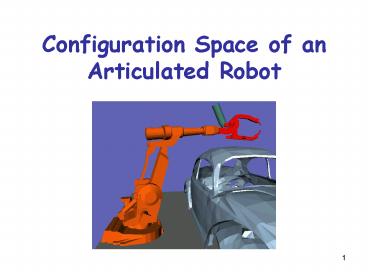Configuration Space of an Articulated Robot - PowerPoint PPT Presentation
1 / 36
Title:
Configuration Space of an Articulated Robot
Description:
Two-Revolute-Joint Robot. A configuration of a robot is a list of non-redundant parameters that fully ... In this robot, one possible choice is: (q1, q2) The ... – PowerPoint PPT presentation
Number of Views:777
Avg rating:3.0/5.0
Title: Configuration Space of an Articulated Robot
1
Configuration Space of an Articulated Robot
2
Idea Reduce the Robot to a Point? Configuration
Space
3
Two-Revolute-Joint Robot
- A configuration of a robot is a list of
non-redundant parameters that fully specify the
position and orientation of each of its bodies - In this robot, one possible choice is (q1, q2)
- The configuration space (C-space) has 2
dimensions
4
(No Transcript)
5
(No Transcript)
6
?
7
?
8
Every robot maps to a point in its configuration
space ...
40 D
15 D
6 D
12 D
65-120 D
9
Every robot maps to a point in its configuration
space ...
40 D
15 D
6 D
12 D
65-120 D
10
... and every robot path is a curve in
configuration space
11
Issues!!
- Dimensionality of configuration space
- Geometric complexity of free region
- ? Plan in configuration space, but compute in
workspace
12
Probabilistic Roadmaps (Sampling-Based Planning)
13
- The cost of computing an exact representation of
the configuration space of a multi-joint
articulated object is often prohibitive. - But very fast algorithms exist that can check
if an articulated object at a given
configuration collides with obstacles. - ? Basic idea of Probabilistic Roadmaps (PRMs)
Compute a very simplified representation of the
free space by sampling configurations at
random.
14
Probabilistic Roadmap (PRM)
Space ?n
15
Probabilistic Roadmap (PRM)
Configurations are sampled by picking coordinates
at random
16
Probabilistic Roadmap (PRM)
Configurations are sampled by picking coordinates
at random
17
Probabilistic Roadmap (PRM)
Sampled configurations are tested for collision
(in workspace!)
18
Probabilistic Roadmap (PRM)
The collision-free configurations are retained as
milestones
19
Probabilistic Roadmap (PRM)
Each milestone is linked by straight paths to its
k-nearest neighbors
20
Probabilistic Roadmap (PRM)
Each milestone is linked by straight paths to its
k-nearest neighbors
21
Probabilistic Roadmap (PRM)
The collision-free links are retained to form the
PRM
22
Probabilistic Roadmap (PRM)
The start and goal configurations are included as
milestones
23
Probabilistic Roadmap (PRM)
The PRM is searched for a path from s to g
24
Basic PRM Algorithm
- FreeConf(q) tests if the configuration q is
collision-free - FreePath(q1,q2) tests if the
straight-line segment between q1 and q2 is
collision-free
25
Collision Checking
- Check if objects overlap
26
Hierarchical Collision Checking
- Enclose objects into bounding volumes (spheres
or boxes) - Check the bounding volumes
27
Hierarchical Collision Checking
- Enclose objects into bounding volumes (spheres
or boxes) - Check the bounding volumes first
- Decompose an object into two
28
BVH of a 3D Triangulated Cat
29
Monte Carlo Integration
x1
x2
30
Why Does PRM Work?
- In most feasible spaces, every configuration
illuminates a significant fraction of the
feasible space
31
Narrow-Passage Issue
32
Experimental Data
33
Experimental Convergence Rate of Basic PRM
Algorithm
34
Experimental Convergence Rate
35
(No Transcript)
36
Key Topics for Future Lectures
- Collision checking
- Sampling strategy































